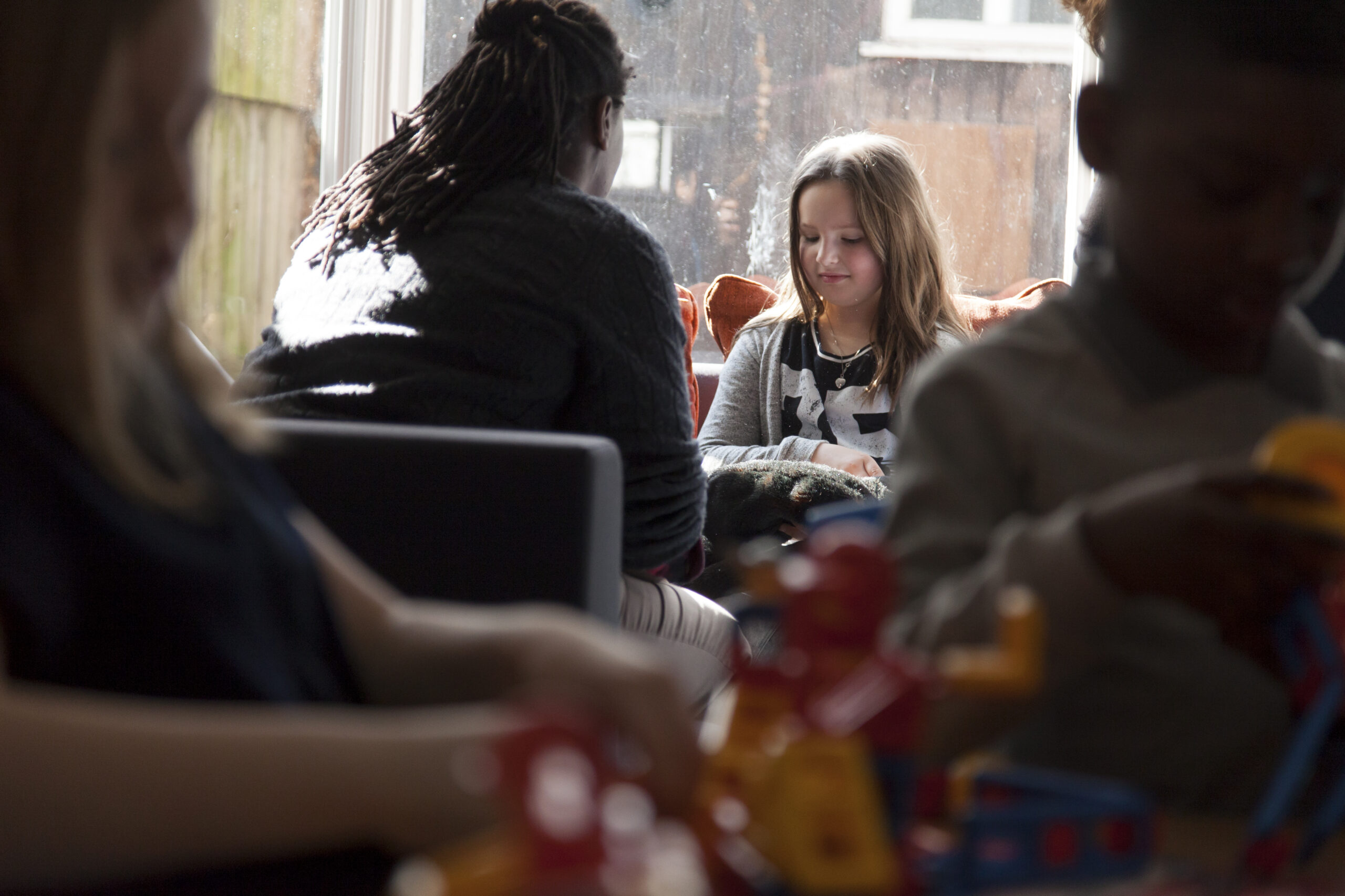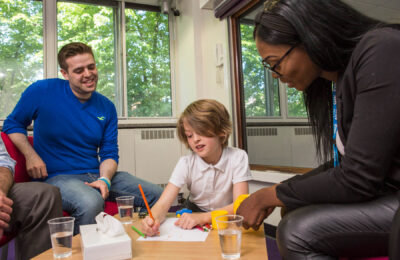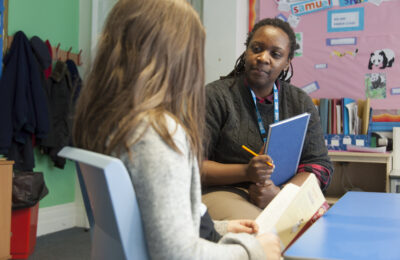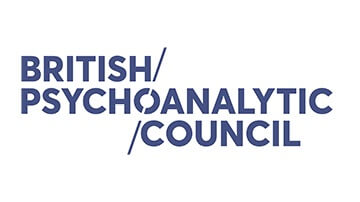
Psychological therapies with children, young people and families (M34)
Join us and become a capable and skilled child, adolescent and family mental health practitioner
Please note: you may see the M34 course also referred to as PTMATP001 in communications from our application system.
About this course
You will train to offer therapy based on psychodynamic and systemic approaches, as well as other evidence-based treatments, such as mindfulness.
In year one you will:
- study theory on assessment and engaging in therapeutic work
- attend specialist workshops on difference, identity and diversity
- partake in small supervision groups
- learn how to approach research
- have fortnightly individual supervision
- attend evidence-based practice seminars, including on mindfulness
- be in a work placement where you have the opportunity to see children, adolescents and families for clinical work using a psychodynamic framework, including individual psychotherapy
In year two you will:
- study theory on the psychodynamic therapeutic approach
- attend evidence-based practice seminars on systemic approaches
- attend specialist workshops on working in schools or adolescence
- partake in small supervision groups
- have fortnightly individual supervision
- carry out therapy in your placement
In order to be qualified as a psychodynamic psychotherapist, you will need to complete the full two years of the academic programme including all required clinical work.
If sufficient clinical work has not been completed during this time to reach BPC accreditation standards, this can often take at least one additional year. Although this is a two year master’s programme, students may exit after one year with a postgraduate diploma (PgDip).
Modules
Module 1: Engaging clients in psychotherapy
- Year of Study: Year One
- FHEQ Level: Level 7
- Credit Weighting: 20 credits
- Module Status: Core
Module Aims
- To develop the assessment and engagement skills needed to work therapeutically in Child and Adolescent Mental Health Services (CAMHS), educational institutions and other voluntary and public sector services which provide therapeutic interventions for children, adolescents and families.
- To enable students to use current evidence, assessment and diagnostic criteria to develop hypotheses and make sense of a client’s presenting issues.
- To enable students so make formal assessments, case formulations, and to develop treatment plans with associated care packages.
- To enable students to recognise how cultural, ethnic, social class and ecological factors affect presentation and engagement in therapeutic work.
- To explore the psychodynamic theoretical framework, as well as the history of the development of this treatment approach, and exposure to relevant psychodynamic literature.
- To explore working with parents within a psychodynamic framework.
- To explore an evidence based approach, Mindfulness, at an introductory level.
Module Assessment
Students are required to submit a 4,000-word assignment based on one or two of their clinical cases. Students are also clinically assessed by their supervisors.
Module 2: Developing Skills in Specialist Areas of Child and Adolescent Mental Health Practice
- Year of Study: Year One
- FHEQ Level: Level 7
- Credit Weighting: 20 credits
- Module Status: Compulsory
Module Aims
- To develop students’ knowledge, capabilities and skills in a selected area of clinical interest through active participation in a clinical workshop that will run during the course of the academic year.
- To provide students with opportunities to present cases, apply theory, discuss papers, extend their knowledge and skills, and develop models of best practice and research interests.
- To provide students with clinical supervision by clinicians experienced in the particular area of study, offering further opportunities for presenting and developing clinical expertise.
- To enable a analysis of students’ therapeutic work vid discussion with peers and supervisors, allowing an integration of theory and practice and an exploration of the complexity of the work.
Module Assessment
Students are required to present a 4,000-word clinical paper/critical case study of a case from within this area of study informed by relevant clinical and research evidence.
Module 3: Research for Clinical Practice: Understanding, appreciation and application of research for use in clinical work
- Year of Study: Year One
- FHEQ Level: Level 7
- Credit Weighting: 20 credits
- Module Status: Compulsory
Module Aims
- To develop students’ understanding of research processes as applied in child and adolescent mental health treatment and care.
- To develop an appreciation of the key methodological and ethical considerations in designing research which aims to address clinical problems.
- To enable the acquisition of critical skills to understand, appraise and evaluate quantitative and qualitative studies in this field.
- To enable the acquisition of core research skills such as electronic literature searching.
- To develop an understanding of the principles underlying qualitative and quantitative research paradigms; designs, methods and forms of analyses.
- To develop an understanding of research findings and evidence in relation to therapeutic alliance and curative factors as they pertain to different psychological therapies.
Module Assessment
Students are required to submit a 4,000-word critical evaluative literature review.
Module 4: Therapeutic Skills
- Year of Study: Year Two
- FHEQ Level: Level 7
- Credit Weighting: 30 credits
- Module Status: Core
Module Aims
- To continue to develop an in-depth understanding of psychoanalytic thinking and approaches to work with children, young people and families.
- To deliver training in at least two evidence-based interventions, developing specialist skills and capabilities in a specific treatment modality, as well as the confidence and informed authority to be able to deliver this where appropriate.
Module Assessment
Students are required to submit a 5,000-word clinical paper. Students are also assessed through their supervisor’s clinical assessment report.
Module 5: Developing and Enhancing Skills in Specialist Areas of Child and Adolescent Mental Health Practice
- Year of Study: Year Two
- FHEQ Level: Level 7
- Credit Weighting: 30 credits
- Module Status: Compulsory
Module Aims
- To develop further students’ specialist knowledge, capabilities and skills in a selected area of interest, through active participation in specialist clinical workshops.
- To allow students to focus on an interest in the complexities of therapeutic interventions with a particular targeted client group or setting.
- To provide opportunities for students to present cases, apply theory, discuss papers, extend their knowledge and skills, and develop models of best practice and research interests.
- To provide students with clinical supervision by clinicians experienced in the particular specialist area, offering further opportunities for presenting and developing specialist clinical expertise.
- To enable detailed analysis of student’s therapeutic work through discussion with peers and supervisors, allowing an integration of theory and practice and an exploration of the complexity of the work, in the context of their workshop experience and in the context of psychodynamic, systemic and specific modality theoretical insights.
- To build upon, enhance and consolidate existing therapeutic knowledge, skills and capabilities.
Module Assessment
Students are required to submit a 6,000-word “mini dissertation” and a 1,500-word self-reflective piece, discussing their professional journey during the course.
Who is this course for?
This course is for you if you are working in a voluntary or statutory sector setting with children and families. For example, you may be a:
- counsellor
- social worker
- teacher
- psychotherapist
- creative arts therapist
- child and adolescent primary mental health care worker
- child and adolescent mental health services (CAMHS) practitioner
- occupational therapist
- nurse
This course may also be for you if you have completed one of our pre-clinical courses but, while it will stand you in good stead, the completion of an introductory or pre-clinical course is not a guarantee of gaining a place on the next course in the pathway.
All clinical courses require an interview and our tutors ensure they thoroughly assess an applicant’s professional and personal suitability for both taking on further training and offering therapy to others.
Many people are successful in progressing on to their chosen course but it is important to note that acceptance on to one of our courses encompasses much more than fulfilling academic requirements.
Course details
In order to undertake this course, we ask that you:
- have successfully completed our course in Child, adolescent and family mental wellbeing multidisciplinary practice (D24), or
- have successfully completed Working with children, young people and families: a psychoanalytic observational approach (M7, daytime) to the minimum of postgraduate certificate level (previously diploma level), providing you have achieved 60 credits which include an assessed observational module i.e. 20 hours of infant observations or completion of a recognised, assessed and accredited module of systemic family observations, or completion of a recognised assessed module of institutional observations, and the necessary experience of working with children/young people, together with meeting the other eligibility criteria for the course
- have substantial experience of working with children, young people or families where you had a remit to address their behavioural, emotional or psychological difficulties
- hold an appropriate professional qualification relevant to your chosen career or can demonstrate that you have a significant level of knowledge and experience in a dedicated field working with children, adolescents and families
- have at least three years’ practice experience since qualification
- hold an undergraduate degree, degree equivalent or evidence of other relevant post-registration education/experience
- be in a full-time or part-time post (paid or voluntary) in which you are working with children and/or families and where you have the opportunity to provide individual therapy with children and adolescents
- are in personal therapy for a minimum of one session per week with a BPC accredited psychoanalytic psychotherapist or psychoanalyst by the time the course starts
If you are invited to interview, you will be asked to demonstrate how you meet our professional suitability and clinical eligibility criteria.
Not completed one of our pathway courses?
Applicants must demonstrate that their prior learning and experience is equivalent to the content and learning outcomes of Child, adolescent and family mental wellbeing multidisciplinary practice (D24). In particular, this must include an observational module as detailed above and participation in work discussion groups, along with 60 credits at Level 7 (PgCert).
This must be detailed within the application and will be further explored during any subsequent interviews. If you are unsure about whether your prior learning/experience is equivalent to the above course, please contact us to discuss.
Home
£7,120 per year (2025/26)
International
£14,240 per year (2025/26)
You will be charged course fees for each year of your course. If your course is longer than one year, the fees that you will be charged after the first year will be subject to an annual uplift, which is not normally expected to exceed 6% or the Consumer Price Index (as stated on 01 September of that academic year) if higher than 6%. At its discretion and in rare instances, the Trust may determine a figure greater than either, to reflect costs associated with the activity (e.g. assessment, teaching, administration etc.), which shall not exceed 10%. Please refer to our Terms and Conditions, and Student Fees & Refund Policy for further information.
Financial support may be available to help you fund your studies at the Tavistock and Portman NHS Foundation Trust.
Assessment
Students will be assessed on the basis of five written submissions over the two year master’s programme. The development of students’ clinical understanding and skills will be assessed in individual and small group supervision and in workshop settings.
Attendance
Wednesdays, 9:00am to 5:30pm or 10:00am to 6:30pm, plus time allowed for clinical placements and weekly personal psychotherapy.
Please note that we require students who have not undertaken Child, adolescent and family mental wellbeing multidisciplinary practice (D24) to take part in a Group Relations Conference during their studies.
Graduates from this course have gone on to work in school settings, voluntary sector psychotherapy services and private work, often with colleagues, as part of a co operative or individually.
Graduates with a core training have also been employed in NHS settings within CAMHS and infant mental health teams.
Application support and deadlines
Interested in this course but have questions before applying? Book a 1-1 session with an admissions advisor to find out more.
There are a number of important application deadlines associated with our postgraduate courses, however we encourage you to apply as early as possible, as spaces on our courses are limited and can be competitive.
Applications for this course are expected to close on the following dates:
- Monday 30 June 2025: International applicant student visa deadline
- Monday 30 June 2025: Summer application deadline
Why study with us?
This course has been developed by a multi-disciplinary group of clinician trainers and the course design is evidentially based, theoretically sound and committed to the development of clinical skills through practice opportunities and in-depth supervision.
It will enable you to become a capable and skilled child, adolescent and family mental health practitioner with training informed by a range of evidence-based psychological therapies for use in child, adolescent and family mental health work.
This course will equip you academically and professionally for a role that has become increasingly needed in the public sector child and adolescent workforce, child and adolescent mental health service sector, schools and other settings.
Testimonials
Course facilitators
Accreditations
This course has been accredited by the British Psychoanalytic Council (BPC).
Apply now
Start your application for this course.
Recommended courses
Explore courses to study beforehand
-
 Postgraduate certificate
Postgraduate certificate 
Child, adolescent and family mental wellbeing: multidisciplinary practice (ED24, online)
Explore courses to study next
-
 Professional doctorate Eligible for Student Visa
Professional doctorate Eligible for Student Visa
Child and adolescent psychoanalytic psychotherapy (M80)
